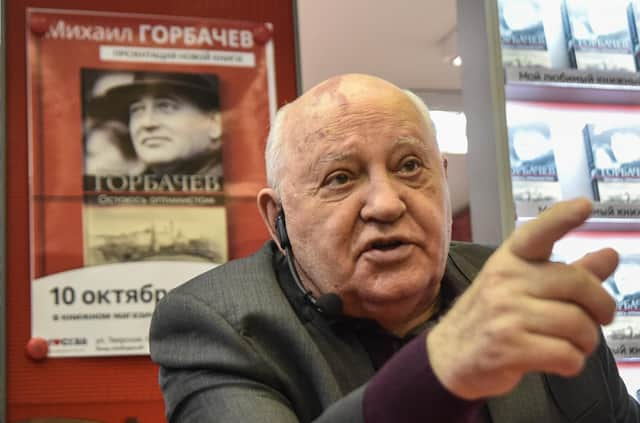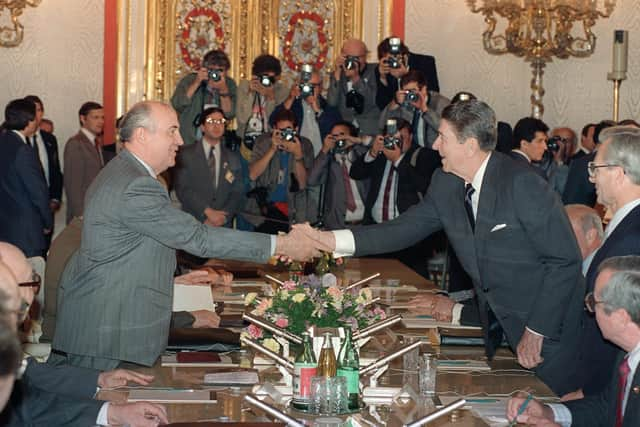Mikhail Gorbachev's legacy is complicated but what stands out is his commitment to peace – Joyce McMillan


His aim was to try to calm the mounting demand there, as in the other two Baltic states, for national independence, and freedom from the USSR; and in his famous relaxed style, he attempted a walkabout, to meet a few assembled Lithuanian citizens.
In the picture, though, it’s clear that his attempt at genial persuasion is not going well; the faces of the crowd are a picture of angry scepticism, and Gorbachev looks hurt, offended and slightly baffled by the depth of their alienation from the Soviet system.
Advertisement
Hide AdAdvertisement
Hide AdIt’s an image, in other words, that perfectly captures one of the contradictions at the heart of Gorbachev’s career; and helps to explain the extraordinarily varied response to his death, ranging from praise in most western capitals, and the barest possible nod from the Kremlin, to raging contempt, not least from patriotic Putin-supporting Russians furious with Gorbachev for destroying Soviet greatness.
Of all these responses, the positive reaction in the West is by far the easiest to read. From the moment in 1984 when Margaret Thatcher declared Gorbachev – still not yet Soviet leader – a man that she liked and could do business with, western leaders of the right and centre have seen him as a kind of trophy, the communist leader who finally threw in the towel, and let western-style capitalist freedoms prevail.
Gorbachev, of course, never saw himself in this light at all. His aim was to reform the Soviet system through “glasnost”, or openness, so that it could correct its own problems.
He was also, though, a serious man of peace, who strongly wished to lift the threat of nuclear war that had hung over the world since the late 1940s, and to improve relations with the West to that end; the images of him signing preliminary arms reduction treaties with Ronald Reagan reflect his delight at the easing of that threat.


And it’s perhaps that commitment to peace, and unease at the extreme violence of recent Soviet history, that best explains his astonishing legacy in eastern Europe, where within a generation, so many countries that were once part of the Warsaw Pact – although never of the USSR – have made the journey from total Soviet domination, to their new status as thriving western countries in full membership of the European Union.
And although Gorbachev is still hated, in the former Soviet Baltic states, Georgia and beyond, for the 1991 military deployments which killed dozens of peaceful pro-independence campaigners, even his bitterest critics there must know that if he had responded with a full Chinese-style military and civil rights crackdown, that death toll could have been many hundreds of times higher, and the outcome very different.
About Gorbachev’s contested legacy, there are therefore perhaps three things worth saying, at this still early stage in the assessment of his career. The first is that if he was naive, it was not – as a Putin spokesman gracelessly suggested this week – because he had a romantic view of the West, but because he had a romantic view of the Soviet system, and its capacity to reform itself; when he became president, it was far later than he and his fellow modernisers realised, for an increasingly detested Soviet system.
The second is that it was emphatically not Gorbachev, but his successor Boris Yeltsin and the rafts of western “advisors” who moved in on Russia after 1991, who ravaged Soviet social provisions for vulnerable Russian citizens, presided over a soaring 1990s death rate that remains one of the great unrecognised crimes of the last generation, and allowed the emergence of the toxic form of KGB-backed gangster capitalism that prevails in Russia today.
Advertisement
Hide AdAdvertisement
Hide AdAnd thirdly, there is an edge to some of the criticism of Gorbachev – and not only from the Kremlin – which despises him because he was “weak”, and failed to use extreme violence to preserve the Soviet system.
I visited Moscow in 1989, courtesy of the wonderful Third Eye Centre in Glasgow, and its New Soviet Realities programme; I remember the fear on the faces of the old Soviet officials we met, their tinted glasses and vodka-soaked smell, their tangible longing for the crackdown that would put the genie of glasnost back in the bottle.
I also met Gorbachev once, at a conference in Valencia in the mid-1990s; shook his hand, and heard him speak about peace in Europe. And what links those two experiences is the sense of the man’s deep aversion to violence, and to the horrific slaughter that marked recent Russian history. Of course, Gorbachev must often have been complicit in violence, as a member of the communist nomenklatura that ran the USSR.
As leader, though, he held his hand, and never authorised the extreme repression and brutality, from Vladivostok to Berlin, that might have kept that dying system in place for a few more years or decades.
For that, he will be despised by those who glorify death when it suits their purposes, and treated more gently by those who love life, and wish to avoid the horrors of war.
And perhaps, in this autumn of 2022, that is as much as we can say about the legacy of Mikhail Gorbachev, and of his late wife Raisa, who is said to have greatly influenced his thinking; that they wanted to improve a failing system, kill less, and co-operate more, and found that that relatively modest ambition was enough to destabilise and remake the post-war world, in ways they could never have imagined, or controlled.
Comments
Want to join the conversation? Please or to comment on this article.

